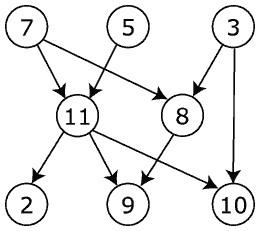Michael Tobis does it again, a substantial moral analysis of global warming denial:
Not Evil, Just Wrong (Mostly) - Michael Tobis - Only In It For The Gold: "
I have no trace of a doubt that sustainability issues are ethical issues. Talking about ethical issues without mention of evil is a bit like playing hockey without looking at the puck.
[...]
Let me be clear. As the movie title (incorrectly I think) claims about President-elect Gore, it is possible to be 'not evil, just wrong' about issues of substance.
I believe most of the people who are participating in the attacks on climate science are doing so more or less in good faith, having been led down a path of bizarrely twisted interpretations of who we climate scientists are, what we do, and how we got to where we are. The question is who has been doing the leading.
The confusion about climate science pretty much requires a complete ignorance of the tradition of
Jule Charney, [...] and the profound and elegant depth of its achievements. People to whom the Charney tradition is invisible perceive a vastly less sophisticated science than actually exists. It's odd; you'd think the visible improvement in weather forecasting would carry some weight [...]
The Charney tradition (along with the related
Stommel tradition in oceanography) is the intellectual core of climatology, but it's pretty much invisible to the outside world. It just doesn't reduce to a nutshell easily. (And at least when I learned the stuff, the pedagogy was lousy to make matters even worse.) So it's easy for people to have essentially no idea that a real and rich science exists. They will put climatology on a par with, say, ecosystem dynamics or economics in 'maturity'.
[...]
But this underestimation is not enough to account for our present dysfunction on this matter.
The underestimation of the sophistication of planetary physics does not suffice to argue for 'no need to control CO2 emissions'.
Consider what the evidence actually shows based on simple physics that predates Charney and Stommel. As is well-known, that evidence (based in radiative transfer and broadly confirmed in plaeoclimate observations) shows that greenhouse gases play a significant role in the energy flows through the system, so that once human perturbations on CO2 concentrations become comparable to and ultimately exceed natural CO2 concentrations, the balance would necessarily change. We also know from geological evidence that very large shifts in climate are possible in consequence of relatively small forcings.
Consequently, large CO2 increases are risky. The less we stipulate that we know about the system, the less we can constrain those risks. The plausible worst case (say the 5% credibility scenario) gets more expensive the less we know. Thus the less we know, the more vigorously we ought to refrain from emissions.
[...]
[... We] are in trouble as a consequence of the success of this program of misdirection and fearmongering. The techniques being used to undermine the communication channels between legitimate science and competent governance will be with us forever. We will forever be challenged by the malicious techniques that have been developed in this trumped-up debate.
We had better develop an immune system to this sort of bullshit or sooner or later some sort of spectacular disaster will result.
"
Michael puts a fine point on it in the comments below:
[...]
At issue here is a bunch of more or less innocent scientists, maybe splitting a hair wrong once in a while this way or that. It's about a scientific subculture supported in substance by every major scientific body on earth, and subjected to what amounts to the extreme libel and defamation. [...]
[...]
If you compare this to a few dozen grumpy bearded green guys who'd love to be just as mean and nasty if they could, you are just resorting to the journalist's favorite hiding place, the middle.
I don't even know if the bearded guys exist, frankly. But even if they do, what importance do they have in the face of this grotesque and successful organized lying, by major media outlets, senators, governors, CEOs and even preachers?
I know balance is your stock in trade as a J-school type, but some situations just don't balance. It's not a law of nature that bad guys are equally distributed on both sides. You actually have an ethical responsibility to pick this time, and to do it right.
Please. Get real. This matters.
The only thing in the favor of those who care about the truth is that the situation is not simply going to go away.
 Image via Wikipedia
Image via Wikipedia![Reblog this post [with Zemanta]](http://img.zemanta.com/reblog_e.png?x-id=8ef4a4cc-bebe-4247-9362-6ca7dda1b75d)





![Reblog this post [with Zemanta]](http://img.zemanta.com/reblog_e.png?x-id=86bfa1eb-e746-4e89-9191-0364d781c6cf)


![Reblog this post [with Zemanta]](http://img.zemanta.com/reblog_e.png?x-id=7446eff2-52aa-4877-a96f-1cfecc657fca)


![Reblog this post [with Zemanta]](http://img.zemanta.com/reblog_e.png?x-id=5a9bee02-8bf5-4650-b621-55fca6eed4f2)



![Reblog this post [with Zemanta]](http://img.zemanta.com/reblog_e.png?x-id=82b1af38-5d7f-48d4-838e-fdd3ad5d8266)

![Reblog this post [with Zemanta]](http://img.zemanta.com/reblog_e.png?x-id=26e2ee91-5b30-4435-acf0-4785d131c6ad)


![Reblog this post [with Zemanta]](http://img.zemanta.com/reblog_e.png?x-id=0cb5ecc4-71f2-439d-bfb0-cd1de6497186)


![Reblog this post [with Zemanta]](http://img.zemanta.com/reblog_e.png?x-id=2cb38235-d42f-40ac-8153-b6c8175fbc61)


![Reblog this post [with Zemanta]](http://img.zemanta.com/reblog_e.png?x-id=736a5c6c-662b-4a8b-93fc-6b9f7fa61557)


![Reblog this post [with Zemanta]](http://img.zemanta.com/reblog_e.png?x-id=3e14185a-e942-40f5-984c-dc210db33ffb)


![Reblog this post [with Zemanta]](http://img.zemanta.com/reblog_e.png?x-id=f18a60dd-e53d-4cce-8216-8be40696d5b2)


 Matt, thanks for taking the time to put this together. The optimizations applied by promise are certainly not in the same league as something like psyco - they have to be quite well targeted to have any measurable effect.
Matt, thanks for taking the time to put this together. The optimizations applied by promise are certainly not in the same league as something like psyco - they have to be quite well targeted to have any measurable effect. ![Reblog this post [with Zemanta]](http://img.zemanta.com/reblog_e.png?x-id=1a43c7e7-721a-4374-86a7-0cb97660a621)


![Reblog this post [with Zemanta]](http://img.zemanta.com/reblog_e.png?x-id=a5d5fe46-9b80-4c8b-b2c1-8d3daeeb4ed4)